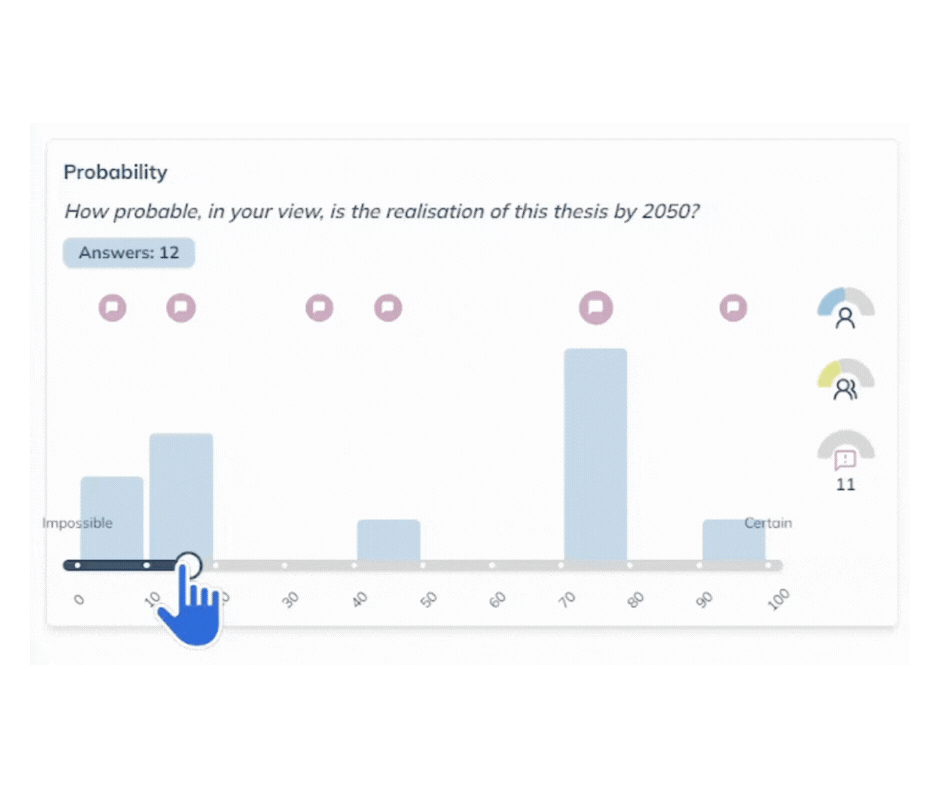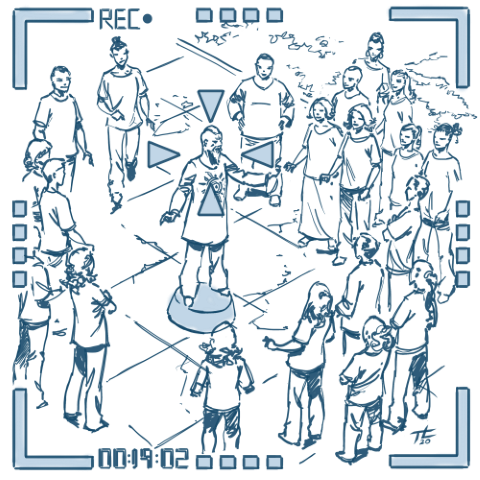Top 12 lessons learned from hundreds of Delphi studies
(I wish I knew this before my first Delphi)

The Delphi method is an exceptionally potent tool – from guiding global strategies to shaping effective government policies and driving successful business strategies, the power of collective intelligence is nowadays more indispensable than ever. Over years, and after facilitating hundreds of studies across diverse sectors – using everything from literal pen-and-paper in high-security settings to basic online tools and now sophisticated next-gen Real-Time Delphi (RTD) platforms – certain lessons emerge repeatedly. These are insights that, if applied consistently, can dramatically elevate the quality and impact of any Delphi project. This article distills key lessons learned from extensive practice to help you to harness Delphi’s power, fostering collaboration and generating valuable insights for true understanding and data-driven decision-making. In short: to achieve better results, faster.
-
Lesson 1: The right platform isn’t optional, it’s foundational.
Insight: Attempting Delphi with generic survey tools, spreadsheets, or email is practically guaranteed to be tedious, error-prone, and ineffective. These tools lack the specific features for managing anonymity, iteration, feedback loops (especially real-time), and qualitative data exploration essential for a smooth and insightful process. It results in a clunky shadow of what modern Delphi can achieve.
Practice: Treat platform selection as a critical design step. Use dedicated Delphi platforms. Prioritize modern, user-friendly systems built specifically for the method, offering robust features and an intuitive experience.
-
Lesson 2: Secure AND simple login prevents utter data chaos.
Insight: Poorly designed login systems are a nightmare. For example, relying on invitation links that fail to reliably recognize returning users (creating duplicate entries each time the link is clicked) can corrupt your entire dataset, rendering weeks of effort useless. I wish this wasn’t from my own experience!
Practice: Insist on robust, reliable authentication that always recognizes returning participants correctly (e.g., trusted social logins). Prioritize platforms that ensure data integrity while making login seamless for participants.
-
Lesson 3: User experience dictates engagement and data quality.
Insight: Experts are busy people. A clunky, confusing, or frustrating platform interface actively discourages participation. This leads directly to lower engagement, higher dropouts, rushed answers, and ultimately, poorer quality insights.
Practice: Prioritize platforms offering a clean, modern, intuitive user experience. An effortless interaction respects participants’ time, encourages deeper thought, improves retention, and yields significantly better data.
-
Lesson 4: Resist the ‘kitchen sink’ – less is often more in questionnaire design.
Insight: There’s a strong temptation, especially when clients invest resources, to pack too much into one Delphi study (“while we have the experts…”). Overly long or complex questionnaires inevitably lead to participant fatigue and superficial responses, defeating the purpose.
Practice: Be disciplined in questionnaire design. Focus ruthlessly on the core objectives. Keep the number of questions and required inputs manageable. It’s far better to get deep, considered insights on essential topics than shallow answers across too many.
-
Lesson 5: Keep question types simple for clearer reasoning.
Insight: While modern platforms support various complex question types (matrix grids, sorting), using them heavily in Delphi can backfire. Why? Because it forces participants to justify multiple related judgments at the same time (e.g., explaining the entire ranking of 5 items at once). This makes reasoning diffuse, difficult to write clearly, and hard for others to interpret or respond to specifically, diluting the crucial qualitative feedback loop.
Practice: Stick primarily to simpler, more intuitive question formats where possible (e.g., quantitative sliders, single-choice Likert scales, direct estimates). These allow participants to provide a focused justification directly linked to a single assessment, making the reasoning clearer, more impactful, and easier for the panel to learn from. Prioritize clarity of reasoning over complex question mechanics.
-
Lesson 6: The qualitative ‘why’ is where the strategic value lies.
Insight: Focusing solely on quantitative scores (averages, convergence) misses the richest part of Delphi. The real gold – the context, assumptions, novel ideas, and understanding of disagreements – is in the qualitative justifications. Ignoring or under-analyzing this is a critical error.
Practice: Plan for rigorous qualitative analysis from the start. Critically, choose platforms with integrated tools that make exploring and analyzing this vital information efficient and insightful, even at scale (for both the respondents and the organizers).
-
Lesson 7: The goal is understanding, not forced agreement.
Insight: Framing Delphi solely as a consensus-forcing tool is a huge mistake. While informed consensus is often a valuable outcome, the primary goal should be fostering shared understanding of the issue and the reasoning behind diverse perspectives. Pushing for numerical consensus and designing the survey (not to mention the Delphi platform!) around it can mask valuable dissent and overshadow the primary goal – true understanding.
Practice: Design and facilitate the study to explore the full spectrum of views constructively. Value the clear articulation of reasoned disagreement as much as agreement. Choose platforms that make it easy to explore opposing viewpoints and draw inspiration from them.
-
Lesson 8: Expert confidence is a poor guide
Insight: Decades of research (like Tetlock’s ‘hedgehog vs. fox’ work) show expert confidence is a surprisingly unreliable guide to accuracy on complex issues. Overconfident experts (‘hedgehogs’) are often less accurate than more cautious, adaptable thinkers (‘foxes’). Relying on expressed confidence for panel selection or weighting inputs risks amplifying flawed judgments.
Practice: Be skeptical of high confidence. Actively seek cognitive diversity (‘foxes’) alongside subject expertise during selection ((see: Expert overconfidence: Addressing the ‘hedgehog’ problem in Delphi panels). Critically, avoid weighting contributions by self-rated confidence – it’s methodologically risky and can be counter-productive. Instead, focus on the quality of reasoning and utilise tools that make qualitative exploration and analysis efficient and insightful.
-
Lesson 9: Outlier views need visibility – they might be crucial.
Insight: Statistically marginalizing outliers can mean discarding innovative ideas or critical warnings. Effective Delphi requires ensuring these perspectives and their reasoning are seen and considered.
Practice: Use platforms that visualize the full distribution and make it easy to notice and explore the arguments behind minority viewpoints. Platforms like 4CF Halnyx 2.0 are designed to surface these potentially vital insights.
-
Lesson 10: Flexible navigation is essential for reflection and interaction.
Insight: Experts don’t always think linearly. They need to revisit questions based on later thoughts or, crucially in RTD, based on new comments or shifts in group opinion they observe. Rigid, sequential platforms kill this dynamic reflection.
Practice: Ensure your platform allows complete freedom of movement, enabling participants to navigate instantly to where their attention is needed (and automatically drawing their attention to those places!), fostering a truly interactive and iterative process.
-
Lesson 11: Modern RTD usually beats MRD (know the exceptions).
Insight: While classic Multi-Round Delphi (MRD) established the principles, its slowness and logistical burden make it impractical for many modern needs. Well-implemented Real-Time Delphi (RTD) is not only vastly more efficient and engaging but, with next-gen platforms, can facilitate even deeper understanding through dynamic interaction and reasoning exploration.
Practice: Default to using advanced RTD platforms unless specific, unavoidable constraints necessitate separate rounds. (For absolutely extreme security needs, I once had to revert to pen-and-paper MRD, but this is a rare exception proving the general rule of RTD’s superiority today).
-
Lesson 12: Closing the loop builds crucial goodwill.
Insight: Experts invest significant time and thought. Failing to share results or acknowledge their contribution is poor practice and harms future recruitment efforts.
Practice: Whenever possible, plan to provide participants with a summary report (maintaining anonymity) and offer thanks. It shows respect and closes the engagement professionally.
From experience to excellence in Delphi
Mastering Delphi comes from understanding both its powerful principles and its practical pitfalls. These lessons, gleaned from extensive experience across various implementations, highlight a crucial theme: success in modern Delphi relies heavily on thoughtful methodology coupled with the right technological tools. By avoiding common mistakes and leveraging next-generation RTD platforms like 4CF Halnyx 2.0 – designed specifically to facilitate deep understanding, manage complexity efficiently, and enhance participant engagement – you can consistently unlock the profound collective intelligence that makes Delphi such a valuable method for navigating our increasingly complex world.

Experience the next generation of Delphi
4CF Halnyx 2.0 provides the intuitive, powerful, and insight-focused platform needed to conduct effective Real-Time Delphi studies that deliver meaningful results.
Interested in Delphi and RTD? Explore our expert series:
4CF Delphi Expert Series offers comprehensive insights, drawing on extensive experience, covering everything from the fundamentals to advanced applications and the crucial role of next-generation platforms. Whether you're new to Delphi or an experienced practitioner, explore these articles to deepen your knowledge and enhance your results.






Explored these? Discover even more in our full Delphi series
Interested in Delphi and RTD? Explore our expert series:
4CF Delphi Expert Series offers comprehensive insights, drawing on extensive experience, covering everything from the fundamentals to advanced applications and the crucial role of next-generation platforms. Whether you're new to Delphi or an experienced practitioner, explore these articles to deepen your knowledge and enhance your results.
Explored these? Discover even more in our full Delphi series
Stay updated! Subscribe to our newsletter:
By subscribing to our newsletter, you consent to the processing of the provided data. The data controller is 4CF Sp. z o.o., its registered office is located in Warsaw, 10/14 Trzech Krzyży Square, postal code: 00-499.
We process your data solely for the purpose of sending information about 4CF Sp. z o.o. and its activities via e-mail. Your data will be processed until your consent is revoked through a link that will be included in each newsletter. The withdrawal of consent shall not affect the lawfulness of processing based on consent before its withdrawal. Providing your data is voluntary, but necessary if you wish to receive information about 4CF Sp. z o.o. and its activities. We may transfer the data to our suppliers of services related to the processing of personal data, e.g. IT service providers. Such entities process data on the basis of a contract with our company and only in accordance with our instructions. You have the right to request access to your personal data, its rectification, deletion or limitation of processing, as well as the right to lodge a complaint with the supervisory authority. More information about your rights and about the processing of your personal data can be found in our privacy policy.







